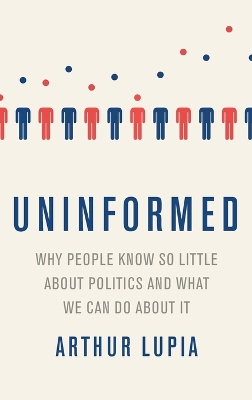Citizens appear to know very little about politics and government. Hundreds of surveys document millions of citizens answering thousands of political questions incorrectly. Given this state of affairs, it is not surprising that more knowledgeable people often deride the public for its ignorance and encourage them to stay out of politics.
As the eminent political scientist Arthur Lupia shows in this capstone work, there are more constructive responses. As he explains, expert critics of public ignorance fundamentally misunderstand the problem, and as a consequence propose unhelpful solutions to a genuinely serious problem. For instance, idea that simply providing people with more facts will make them more competent voters is erroneous. That is because most experts fail to understand how most people learn, and do not know how to
determine what types of information are relevant to voters. Lupia has worked for years with scientists and educators in all arenas to figure out how to increase issue competence among voters in areas like climate change. He draws from these efforts and the latest research on educational efficacy to
develop a battery of techniques that effectively convey to people information that they actually care. If we accept the idea that citizens sometimes lack the knowledge that they need to make competent political choices, that greater knowledge can improve decision making, and that experts and advocates are often mistaken about how people think and learn, then a prescription for improving political knowledge and civic competence emerges: we need to educate the educators. Lupia's ultimate
purpose, therefore, extends beyond politics alone: to help educators of all kinds convey information that is of more value to more people.
- ISBN10 0190263725
- ISBN13 9780190263720
- Publish Date 7 January 2016
- Publish Status Active
- Publish Country US
- Imprint Oxford University Press Inc
- Format Hardcover
- Pages 360
- Language English
